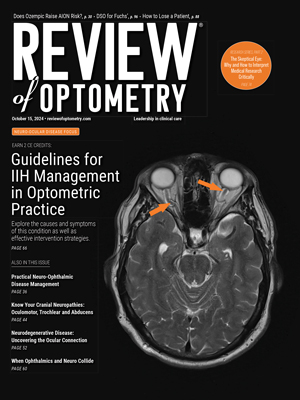While the Dresden protocol of collagen crosslinking (CXL) has been FDA-approved in the United States since 2016, the keratoconus progression treatment has been touted as the best way of management for even longer abroad. Currently, different protocols are being tested in other countries to help provide care in less time and with less risk of corneal complications. Researchers from the Sunderland Eye Infirmary in Great Britain have found that the accelerated CXL protocol can safely halt keratoconus progression over a 24-month period.
The retrospective, non-comparative, interventional case series reviewed 52 eyes from 48 patients who underwent the accelerated CXL protocol, which used 9mW/cm2 ultraviolet-A irradiation for 10 minutes. The protocol shortens the irradiation treatment time while maintaining the same fluence of 5.4J/cm2. After 24 months follow-up, researchers observed that eyes with corrected distance visual acuity (CDVA) greater than or equal to 0.3logMAR significantly improved from 43 preoperatively to 50 (96.2%) eyes. They also observed a significant reduction of Kmax (−1.68D), K1 (−0.64D) and Kmean (−0.50D). Corneal haze was the only postoperative complication, found in 12 eyes. Researchers noted no adverse effects as all cases of mild post-CXL corneal haze were transient and resolved by six months post-op after a course of topical steroids.
The study proposes that early administration of CXL for progressive keratoconus leads to good long-term visual outcomes. The researchers recommend the use of the accelerated CXL protocol in clinical practice because it might be more effective in stabilizing milder forms of keratoconus. Just remember it might not officially come to the United States any time soon.
| Ting DSJ, Rana-Rahman R, Chen Y, et al. Effectiveness and safety of accelerated (9mW/cm2) corneal collagen cross-linking for progressive keratoconus: a 24-month follow-up. Eye. January 4, 2019. [Epub ahead of print]. |

